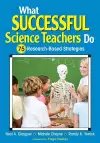
What Successful Science Teachers Do
3 authors - Paperback
£32.99
Neal A. Glasgow′s experience includes serving as a secondary school science and art teacher both in California and New York, as a university biotechnology teaching laboratory director and laboratory technician, and as an educational consultant and frequent speaker on many educational topics. He is the author or coauthor of ten books on educational topics: What Successful Schools Do to Involve Families: Fifty Research-Based Strategies for Teachers and Administrators (2008), What Successful Literacy Teachers Do: 70 Research-Based Strategies for Teachers, Reading Coaches, and Instructional Planners (2007), What Successful Teachers Do in Diverse Classrooms: 71 Research-Based Strategies for New and Veteran Teachers (2006); What Successful Teachers Do in Inclusive Classrooms: 60 Research-Based Strategies That Help Special Learners (2005); What Successful Mentors Do: 81 Researched-Based Strategies for New Teacher Induction, Training, and Support (2004); What Successful Teachers Do: 91 Research-Based Strategies for New and Veteran Teachers (2003); Tips for Science Teachers: Research-Based Strategies to Help Students Learn (2001); New Curriculum for New Times: A Guide to Student-Centered, Problem-Based Learning (1997); Doing Science: Innovative Curriculum Beyond the Textbook for the Life Sciences (1997); and Taking the Classroom to the Community: A Guidebook (1996). Michele C. Cheyne is a clinical faculty member in science education at the University of Pittsburgh where she teaches a variety of courses in the secondary science teacher preparation program. She also supervises pre-service teachers during their clinical experiences. Cheyne has worked with Pittsburgh Public Schools on several projects and provides professional development for professional laboratory training programs. She has also worked with the Interstate New Teachers Assessment and Support Consortium in Washington, DC as a member of the committee that wrote the 2001 document Model Standards for Licensing General and Special Education Teachers of Students With Disabilities: A Resource for State Dialogue. A former high school biology and chemistry teacher in Milwaukee Public Schools, she also served as a department chair and taught science methods courses at the University of Wisconsin-Milwaukee. Randy K. Yerrick is professor of science education and associate dean of educational technology at the State University of New York at Buffalo. He began his career as a chemistry, physics, and math teacher in Michigan schools before becoming a full-time researcher in science education. Yerrick′s research focuses on implementing contemporary visions of science inquiry in lower track classrooms where students share a strong history of failure and antisocial school behaviors. He has conducted ethnographies and critical autoethnographies in a variety of diverse teaching contexts as he continues to examine unresolved school issues of equity and diversity promoted by the continuous practice of tracking in science. He has also received recognition as an Apple Distinguished Educator. Examples of his work can be found at http://edcommunity.apple.com/.